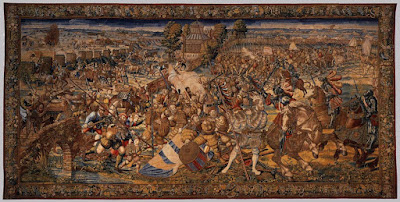Like many people who defied Henry VIII, Thomas More had reason to believe that he may be able to speak his mind while retaining the relationship that he had built with the king over the years. Also like many others, he was fatally incorrect.
 |
| Sir Thomas More by Hans Holbein the Younger |
More did not. And Henry should not have been surprised, for he knew More's past and understood his passion for the church better than most. Even as a young lawyer with a bright future ahead of him, More had considered becoming a monk and had lived as much like one as possible while practicing law at Lincoln's Inn. A desire for marriage and statesmanship kept the devout young man from committing himself to the life of a Carthusian.
Even as a married man, More had lived much less ostentatiously than the typical Tudor courtier. He was generous and hospitable but never glamorous. The habit of wearing a hair shirt beneath his clothing that he had picked up while living in the monastery was maintained for the remainder of his life. Striving to serve his country and the people, More was hesitant to become too close to the king. Despite being Henry's confidant and having been awarded several lucrative positions, More maintained that, "If my head would win him a castle in France, it should not fail to go."
Although More had a clear understanding of his king's willingness to sacrifice others to gain his desires, he was unafraid to challenge him. In writing Utopia, More courageously pointed out immorality and corruption in all areas of society, including government and church. As a new member of Parliament, he spoke passionately against the king's request for funds that More felt placed an unfair burden on the populace. When Henry first presented his evidence for annulment from Katherine of Aragon, More promised to research the issue but not to give his unconditional support.
 |
| Sir Thomas More Bids Farewell to his Daughter by Edward Matthew Ward |
Nothing he read and nothing the king could say convinced More of the righteousness of Henry's divorce. As England's Lord Chancellor, it was More's duty to serve the king and enforce the Act of Succession, which required signed oaths recognizing Henry as Head of the Church. As he refused to sign it himself, More resigned his position. Henry accepted the resignation, and More retired to his estates.
Perhaps he would have been safe yet had More studied and lived the quiet life of a country gentleman. However, he was compelled to write defenses of his faith, and he refused to attend the coronation of Anne Boleyn. More was arrested and sentenced to be hanged, drawn, and quartered - the death of a traitor - when he continued to refuse the oath. In his benevolence, Henry reduced this sentence to beheading. Before his execution, More said he was, "the king's good servant but God's first."
Thomas More, believed innocent by Protestants and Catholics alike, was beatified by the Catholic Church in 1886 and canonized in 1935.
Don't miss the rest of the Defying Henry VIII series!




